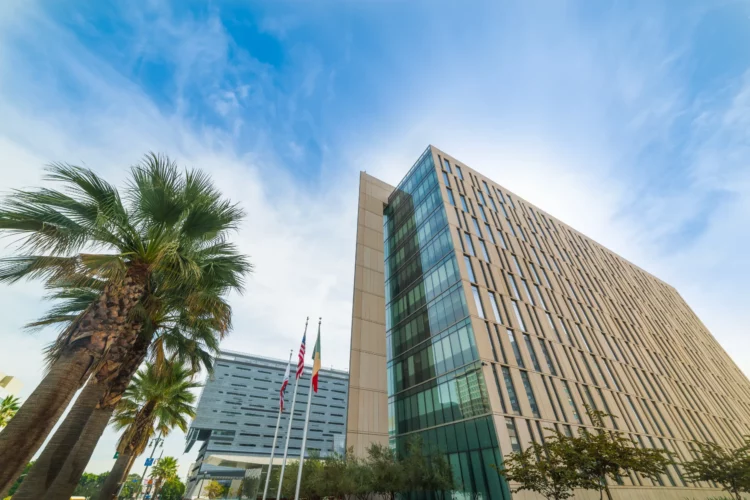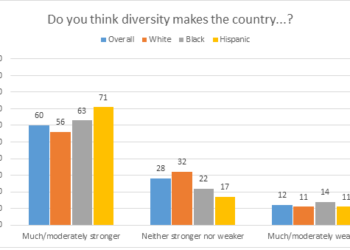A small portion of the Los Angeles population is subject to a high concentration of police stops, and the Los Angeles Police Department’s utilization of targeted predictive policing technology may be intensifying this focused scrutiny. This conclusion is based on a report released this week by the research and activist organization Stop LAPD Spying Coalition. The report uses testimonies from city residents and newly disclosed police documents to depict a “racist feedback loop” in which an “excessive amount of police resources are devoted to historically over-policed communities.”
According to the survey results included in the report, a small percentage of Los Angeles residents experience the majority of police interactions. Two percent of survey respondents reported being stopped by police 11 to 30 times a week or more, while 76 percent of respondents stated they had never been stopped. The 300 survey respondents represented a diverse range of geography, race, age, and gender. In focus groups, individuals living in heavily policed areas described a state of constant surveillance. One resident compared the frequency of seeing police in their area to the number of times they see a bird in a day.
Furthermore, the LAPD has employed technology from data-mining company Palantir as part of a predictive policing program that targets and surveys specific individuals in select neighborhoods based on their recent criminal justice history. Officers and analysts working on Operation LASER (Los Angeles Strategic Extraction and Restoration) are responsible for maintaining a constantly updated list of community residents to monitor by creating “Chronic Offender Bulletins” for persons of interest.
The identification process consists of two stages: an initial screening phase in which a “crime intelligence analyst” subjectively determines if an individual’s police records are “relevant” enough to move them to a “workup” phase. The “workup” phase involves Palantir-provided software that gathers data on criminal history and affiliations from sources like license plate readers and social media networks, and calculates a “chronic offender score” for the individual.
Once an individual is considered a significant threat based on their score, officers send them letters and are encouraged to knock on their doors to inform them of their monitoring status.
Officers are also instructed to seize opportunities to stop or arrest them if they have an outstanding warrant. To be removed from the chronic offenders list, an individual must not have any interactions with the police, creating a Catch-22 since the program aims to flag individuals for increased police attention. Those removed from the list are not notified. By early 2019, the entire city of Los Angeles will be using the LASER program.
The report also examines another predictive policing program used by the LAPD called PredPol. Both Operation LASER and PredPol are sponsored by the federal Bureau of Justice Assistance’s SMART Policing Initiative, which seeks to implement “evidence-based, data-driven” policing strategies to preempt and prevent crime. PredPol software uses a machine-learning algorithm similar to those employed by Facebook and Amazon for advertising purposes. Studies have demonstrated that PredPol technology reinforces racially biased policing patterns and practices, yet it remains in use by the LAPD and at least 50 other law enforcement agencies across the country.
Stop LAPD Spying Coalition filed a lawsuit against the police department in February of this year and received October 2017 documents on Operation LASER, but is still awaiting additional documents related to the program, including information on funding and data sources. The coalition criticizes the scientific assumptions underlying predictive policing for “pathologizing” individuals and entire neighborhoods, and argues that these programs “enable the continuation of decades of discriminatory and racist policing under the apparent neutrality of objective data.”
Unlike PredPol hot spots, LASER zones are determined in part by analysts’ observations of a neighborhood and its residents. The coalition’s community-based focus group results reveal that residents, while not always fully aware of the specifics of police surveillance in their communities, nonetheless have a sense that it is happening. One resident commented, “I feel like they already know who you are by the time they stop you or give you a citation. They already know your name and who you are hanging out with.”
Both Operation LASER and PredPol rely on scientific disciplines: PredPol is adapted from models that predict earthquake aftershocks, while the documents obtained by the coalition indicate that the LAPD uses a series of medical analogies to describe the functions and goals of Operation LASER. The federal Bureau of Justice Assistance (BJA), which sponsors the local program, acknowledges the analogy: Operation LASER “is similar to laser surgery, where a trained medical doctor uses modern technology to remove tumors or improve eyesight,” according to a BJA report.
The Stop LAPD Spying Coalition asserts that the scientific assumptions behind predictive policing contribute to the “pathologizing” of individuals and entire neighborhoods. The coalition maintains that such programs “enable the continuation of decades of discriminatory and racist policing under the guise of objective data neutrality.”
LASER zones, unlike PredPol hot spots, are determined in part based on analysts’ observations of a neighborhood and its inhabitants. According to an LAPD document, analysts ask questions like, “What were they doing? Talking to neighbors? Walking? Driving down the streets slowly? Playing chess in the park? Or, are they dealing drugs on the street corner or just hanging out?”
The coalition’s community-based focus group results indicate that residents, while not always aware of the specifics of police surveillance in their communities, nonetheless have a sense that it is occurring. As one resident said, “I feel like they already know who you are by the time they stop you or give you a citation. They already know your name and who you are hanging out with.”
These findings raise concerns about the impact of predictive policing programs on communities and civil liberties. The concentration of police stops in specific areas may lead to an environment of continuous surveillance, increasing tension between law enforcement and community members. Moreover, the use of targeted predictive policing technologies could perpetuate discriminatory and racially biased practices under the pretense of data-driven objectivity.
Advocacy groups like the Stop LAPD Spying Coalition call for greater transparency and accountability in the deployment and use of predictive policing technologies. In addition to requesting more documents related to the programs, the coalition emphasizes the importance of community engagement and public discourse on the ethical implications of such technology.
It is crucial for law enforcement agencies to balance the potential benefits of predictive policing, such as more efficient resource allocation and crime prevention, with the potential drawbacks, including the perpetuation of racial bias and the infringement on citizens’ privacy rights. As these technologies continue to evolve and proliferate, ongoing evaluation and dialogue will be essential to ensure their responsible use and to safeguard the rights and well-being of all community members.










